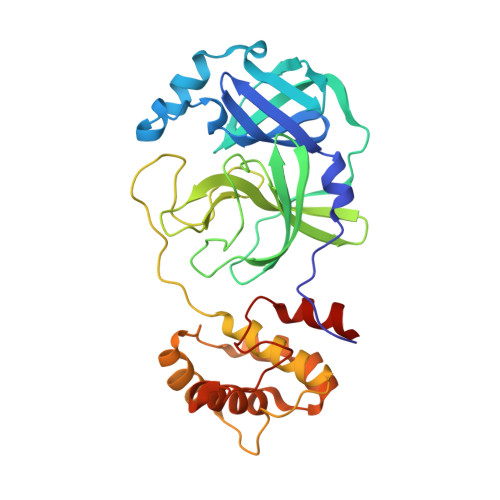Design, synthesis and crystallographic analysis of nitrile-based broad-spectrum peptidomimetic inhibitors for coronavirus 3C-like proteases
Chuck, C.P., Chen, C., Ke, Z., Wan, D.C.-C., Chow, H.F., Wong, K.B.(2012) Eur J Med Chem 59C: 1-6
- PubMed: 23202846
- DOI: https://doi.org/10.1016/j.ejmech.2012.10.053
- Primary Citation of Related Structures:
3VB3, 3VB4, 3VB5, 3VB6, 3VB7 - PubMed Abstract:
Coronaviral infection is associated with up to 5% of respiratory tract diseases. The 3C-like protease (3CL(pro)) of coronaviruses is required for proteolytic processing of polyproteins and viral replication, and is a promising target for the development of drugs against coronaviral infection. We designed and synthesized four nitrile-based peptidomimetic inhibitors with different N-terminal protective groups and different peptide length, and examined their inhibitory effect on the in-vitro enzymatic activity of 3CL(pro) of severe-acute-respiratory-syndrome-coronavirus. The IC(50) values of the inhibitors were in the range of 4.6-49 ¦̀M, demonstrating that the nitrile warhead can effectively inactivate the 3CL(pro) autocleavage process. The best inhibitor, Cbz-AVLQ-CN with an N-terminal carbobenzyloxy group, was ~10x more potent than the other inhibitors tested. Crystal structures of the enzyme-inhibitor complexes showed that the nitrile warhead inhibits 3CL(pro) by forming a covalent bond with the catalytic Cys145 residue, while the AVLQ peptide forms a number of favourable interactions with the S1-S4 substrate-binding pockets. We have further showed that the peptidomimetic inhibitor, Cbz-AVLQ-CN, has broad-spectrum inhibition against 3CL(pro) from human coronavirus strains 229E, NL63, OC43, HKU1, and infectious bronchitis virus, with IC(50) values ranging from 1.3 to 3.7 ¦̀M, but no detectable inhibition against caspase-3. In summary, we have shown that the nitrile-based peptidomimetic inhibitors are effective against 3CL(pro), and they inhibit 3CL(pro) from a broad range of coronaviruses. Our results provide further insights into the future design of drugs that could serve as a first line defence against coronaviral infection.
Organizational Affiliation:
School of Life Sciences and Center for Protein Science and Crystallography, The Chinese University of Hong Kong, Shatin, Hong Kong.



















